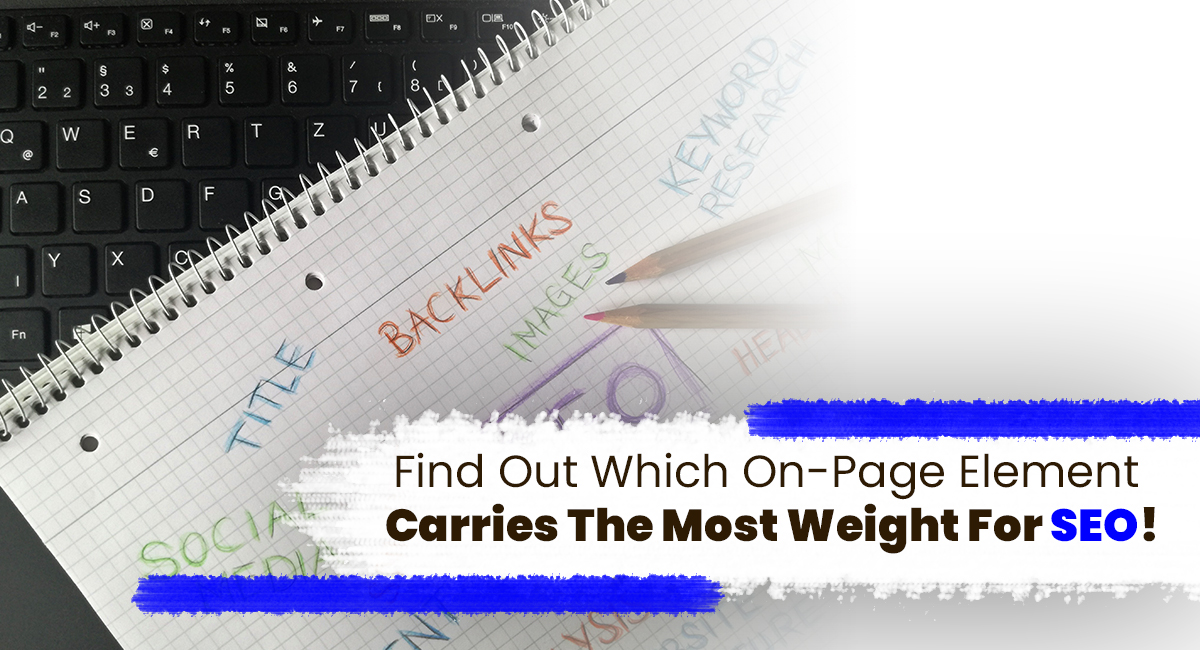Find Out Which On-Page Element Carries The Most Weight For SEO!

Do you know that SEO campaigns, on average, generate 1000 per cent more traffic than typical social media campaigns? In short, you cannot let your SEO strategy fall short.
And to craft a successful SEO plan, knowing which on-page element carries the most weight for SEO is essential.
So, dive into the following section as we discuss the most important on-page SEO factor for top SERP ranking and other influential on-page SEO elements!
Different Types Of SEO
Before jumping into on-page SEO factors, let’s learn a little about different types of SEO.
Some experts may tell you there are four types of SEO, while others say there are five. However, there are primarily three categories of SEO every digital marketer should know about.
• On-page SEO: As the name suggests, on-page SEO is all about on-site or content SEO. It refers to site-related tasks, such as writing content, internal linking and adding images.
• Off-page SEO: Off-page SEO includes the tasks you complete outside of the website, like creating a Google My Business listing and link building.
• Technical SEO: Technical SEO refers to on and off-site tasks that impact a website, such as page indexing and speed optimisation.
Which On-Page Element Carries The Most Weight For SEO?
On-page SEO has several best practices to tick off to rank your website. But, if you ask which on-page element carries the most weight for SEO, most experts will tell you it’s the title tag.
What Is A Title Tag? Why Is It Important?
Title tags are HTML elements that indicate the context of a web page. Only 7.4% of top-ranking pages on Google don’t have a title. The rest know title tags carry the SEO weight of on-page elements.
Your title tags must accurately sum up the content of a web page. Otherwise, there’s a good chance that Google will rewrite it. And it may or may align with your web page’s purpose.
The title tag’s importance in SEO is due to the following factors.
• SERP rankings: When you search anything on Google, you will notice that some parts of the search results are in a blue font. These are title tags that indicate the topics of a page for readers and search engines and significantly influence SERP rankings.
• Visibility on web browser tab: When you open a web page, its title tag shows up in your web browser tab. Acting as a placeholder, it helps users find your web page when they have a lot of tabs opened at once.
• Social media networks relevance: The title tag also shows up when someone shares your website link on social media. An interesting title tag can help you generate more leads through your SMM.
How To Write An Efficient Title Tag?
To write a good title tag, you should try to:
• Write unique titles: Ensure the tag represents each page precisely. Customise the tags to make them more unique but easy to understand for users and search engines.
• Optimise them with keywords: Include the keywords you’re targeting for individual pages. However, avoid keyword stuffing.
• Be careful with the length: Keep the character length of the title tag within 60-70 characters.
• Be descriptive: Use the title tag to clearly describe what users will see when they open the page to reduce the bounce rate.
Other On-Page SEO Best Practices That Carry Significant Weight For SEO
When you search which on-page element carries the most weight for SEO, you will most likely find a long list of best SEO practices for ranking improvement. These practices are as important as having a title tag or heading tag for your web pages.
• Meta description: Meta description’s importance in SEO is well-known. Ideally, a meta description should be within 150 to 160 characters and describe the page content accurately for more clicks.
• Heading tags: From H1 to H6, heading tags describe the context of your content and make it scalable.
• URL: The URL or link of your page is what the users will use to access the website.
• Keywords: Without keywords, search engines will not be able to understand or scale your content.
• Internal links: Internal links between web content and different pages increase its relevance and authenticity.
• External links: Linking your pages and content to other relevant websites increases its credibility.
• Image: Optimise your image titles and alt tags to make the content more attractive to readers and search engines.
• Readability: Appropriately place keywords, use short sentences, paragraphs and headings and add lists to improve content readability.
Wrapping Up
Now that you know which on-page element carries the most weight for SEO, it’s time to improve your on-page SEO strategy with the above tips. Along with on-page SEO, remember to prioritise off-page and technical SEO to have the best results for your website.
